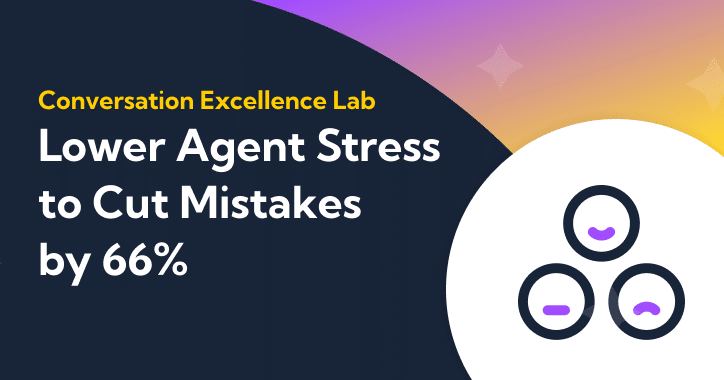At their best, call scripts provide agents with a way to guide their call in a consistent and clear way to achieve optimal call outcomes. Scripts or talk tracks are meant to provide avenues for agents to respond to objections and provide a top-notch customer experience. At their worst, however, they can be prescriptive, clunky, and impersonal.
That being said, scripts remain one of the widely used tools in today’s contact centers, so how can we make them better? Balto, for example, reimagines scripts as dynamic, data-driven Playbooks that only surface talking points to agents when they need them — no memorization needed.
But what about the remainder of the contact center industry that still relies on traditional scripts? The Conversation Excellence Lab conducted a survey of 568 agents to discover what they thought about their script, how often they adhered to it, and more.
Subscribe to future Conversation Excellence Lab reports below:
We asked agents: What, if anything, would you change about your script?
We received 419 answers to the question above, and the responses were as follows:
Figure 1: What do agents want to change about their scripts
Approximately 64% of agents wanted to change their script, whether with something as specific as changing the phrases they use to open a call, or as broad as the general tone and vocabulary throughout. 34% of these respondents wanted to change the length of their call center script, followed by 17% who wanted to improve the overall naturalness and tone, and 17% who wanted their script to be more flexible and dynamic.
These numbers are telling on their own, but an analysis of agent script-writing involvement, agent tenure, and industry differences better illustrates novel trends within these answers.
Agent Involvement with Script Writing
While the majority of agents want to change something about their script, 36% do not. That is not a low number. More than one third of agents would not make a change to their script if given the opportunity.
Agent involvement is a major mediator in this number. We asked agents how involved they are on a scale of 1-5 in writing or updating their script, and agents who reported the lowest involvement in writing their company’s script (2.19) were the most likely to want to change everything about it. Those agents who reported wanting to change nothing at all about their script had the highest rate of involvement (3.53).
Interestingly, the next highest category in terms of script involvement belonged to those who said they wanted more ownership over their company’s script (3.5). This suggests that involvement begets more involvement. Once agents are given the opportunity to provide feedback on their script, they want to keep doing so, perhaps in increasing amounts.
This is a good thing. It shows initiative, buy-in, and an ownership mentality, all of which lend themselves to better performance and retention outcomes. To better understand other factors that impact agent attrition, check out our 2022 Attrition Report.
Figure 2: What agents want to change and their involvement in script writing
The Effect of Agent Tenure
Those agents who had been at their contact center the longest were most likely to want to make their script more flexible or dynamic, followed by making the tone more natural. This makes logical sense: The longer that an agent has worked for a company, the more they’ve internalized the call script. But more than that, they’ve also had opportunities to uncover their own best practices and objection responses.
Giving more tenured agents flexibility to sway from their script or respond dynamically to customer objections is, then, an apt method to increase agent satisfaction with their script and otherwise. Read more about agent tenure and satisfaction in our recent report.
Those agents who had been at their job for the least amount of time were most concerned with changing the length of their script, perhaps because they were in the mindset of learning or memorizing it rather than evaluating its contents.
After script length, agents with lower tenure were most likely to list “everything” as a response to what they would change about their script. They may resent the presence of the script to begin with, both as an aspect of their training and as something they are evaluated on in their new role, or they may not understand the reasoning yet behind different aspects of it.
Figure 3: What agents want to change and their tenure at their current job
Industry Differences in Sentiment Towards Script
In terms of industry, which agents thought their scripts were the best-suited? 50% of our respondents in the Home Improvement industry reported wanting to change nothing in their script, followed by 42% of those in Collections and 39% in Constructions.
On the other end, only 9% of respondents in Travel & Hospitality reported that there was nothing to change about their script, followed by 20% in Utilities and Healthcare, and 21% in Professional Services, Financial Services, and Insurance.
This is just a sample of the population and scripts vary widely both within industries and across them. However, there are still insights to be gleaned from these numbers.
Industries like Home Improvement, Collections, and Construction lend themselves to more predictable calls, and therefore more straightforward scripts. Home Improvement and Construction calls generally seek to either provide customer support or set up appointments, while Collections is concerned with collecting funds.
On the other hand, Travel & Hospitality contact centers may see a plethora of call types: bookings or reservations, cancellations, service issues and other complaints, sales, concierge-type services, general questions, and more.
It may be more difficult to align a script with all of these disparate scenarios, leaving more room for improvement from the agent’s point of view. This variety can be found in Utilities, Healthcare, Professional Services, Financial Services, and Insurance as well.
Figure 4: Industry and percentage of respondents who wanted to change nothing about their script
As our surveyed agents pointed out, there are a lot of areas where a script can go wrong, from being too lengthy and prescriptive to being too narrow and not relevant to the caller’s concerns.
Although we have our own take on scripting at Balto, there is no denying that traditional scripts remain widely used across the industry. While it’s true that the majority of agents want to change their script, this number varies depending on their involvement in writing or editing it, their tenure, and the industry within which they operate.
How do managers adjust accordingly?
If you employ a script, take into account agent feedback about its length, tone, and naturalness, and how flexible or dynamic it allows agents to be. Make sure to check in with agents — especially those who have been at your contact center for multiple years — and involve them in the script-creation process. Regularly source feedback and refine your script based on the measures above (Figure 1) to ensure that your agents are not among those who express discontent.
Subscribe to Conversation Excellence Lab reports here.
Sources
Balto. (2022, January 21). What an Employee’s Age Says About Their Goals in the Contact Center – Balto Ai. RSS. Retrieved April 13, 2022, from https://www.balto.ai/post/age-and-the-contact-center
Balto. (2022, March 29). Contact Center Attrition: What Agents Want in 2022 – Balto Ai. RSS. Retrieved April 13, 2022, from https://www.balto.ai/research/contact-center-attrition-2022/
Pickford, H. C. (2016, October 20). Psychological Ownership: Effects and Applications. Economics of Mutuality. Retrieved April 13, 2022, from https://eom.org/content-hub-blog/psychological-ownership
Cite this report
Balto. (2022, May 3). 2 Out of 3 Contact Center Agents Want to Change Their Script – Balto Ai. RSS. Retrieved from https://www.balto.ai/research/why-contact-center-agents-want-to-change-their-script/






